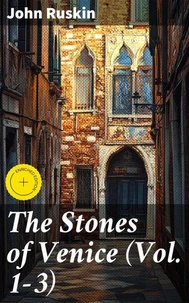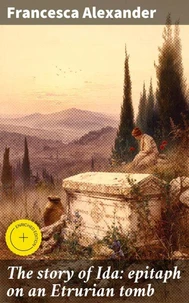Stones of Venice [introductions]. Exploring Venice's Architectural Marvels and Cultural Significance
Par :Formats :
Disponible dans votre compte client Decitre ou Furet du Nord dès validation de votre commande. Le format ePub est :
- Compatible avec une lecture sur My Vivlio (smartphone, tablette, ordinateur)
- Compatible avec une lecture sur liseuses Vivlio
- Pour les liseuses autres que Vivlio, vous devez utiliser le logiciel Adobe Digital Edition. Non compatible avec la lecture sur les liseuses Kindle, Remarkable et Sony
 , qui est-ce ?
, qui est-ce ?Notre partenaire de plateforme de lecture numérique où vous retrouverez l'ensemble de vos ebooks gratuitement
Pour en savoir plus sur nos ebooks, consultez notre aide en ligne ici
- Nombre de pages245
- FormatePub
- ISBN4057664603074
- EAN4057664603074
- Date de parution26/11/2019
- Protection num.Digital Watermarking
- Taille614 Ko
- Infos supplémentairesepub
- ÉditeurGOOD PRESS
Résumé
In "Stones of Venice, " John Ruskin presents a profound exploration of the architectural grandeur and moral significance of Venetian structures. Written in an evocative prose style that seamlessly blends art criticism with social commentary, Ruskin delves into the intricate relationship between architecture and the human experience. His work is deeply embedded within the context of the Victorian era, responding to the rapid industrialization of his time while advocating for a return to craftsmanship and moral integrity in art.
The three-volume series meticulously examines the Gothic style, celebrating its beauty while critiquing contemporary design that, in his view, lacks authenticity. John Ruskin (1819-1900), an influential art critic, social thinker, and philanthropist, was profoundly shaped by his early exposure to art and literature. His travels throughout Europe, particularly to Italy, deepened his appreciation for the aesthetic values of the past, prompting him to reflect critically on the relationship between society, art, and morality.
His passion for architecture was not only rooted in aesthetics but also in a broader philosophical discourse about the moral responsibilities of artists and craftsmen. "Stones of Venice" is essential reading for anyone interested in the intersections of art, architecture, and societal values. Ruskin'Äôs insights challenge the reader to reconsider the implications of design and aesthetics in their own context, making it a timeless text that resonates with contemporary discussions on cultural heritage, craftsmanship, and ethical creation.
The three-volume series meticulously examines the Gothic style, celebrating its beauty while critiquing contemporary design that, in his view, lacks authenticity. John Ruskin (1819-1900), an influential art critic, social thinker, and philanthropist, was profoundly shaped by his early exposure to art and literature. His travels throughout Europe, particularly to Italy, deepened his appreciation for the aesthetic values of the past, prompting him to reflect critically on the relationship between society, art, and morality.
His passion for architecture was not only rooted in aesthetics but also in a broader philosophical discourse about the moral responsibilities of artists and craftsmen. "Stones of Venice" is essential reading for anyone interested in the intersections of art, architecture, and societal values. Ruskin'Äôs insights challenge the reader to reconsider the implications of design and aesthetics in their own context, making it a timeless text that resonates with contemporary discussions on cultural heritage, craftsmanship, and ethical creation.
In "Stones of Venice, " John Ruskin presents a profound exploration of the architectural grandeur and moral significance of Venetian structures. Written in an evocative prose style that seamlessly blends art criticism with social commentary, Ruskin delves into the intricate relationship between architecture and the human experience. His work is deeply embedded within the context of the Victorian era, responding to the rapid industrialization of his time while advocating for a return to craftsmanship and moral integrity in art.
The three-volume series meticulously examines the Gothic style, celebrating its beauty while critiquing contemporary design that, in his view, lacks authenticity. John Ruskin (1819-1900), an influential art critic, social thinker, and philanthropist, was profoundly shaped by his early exposure to art and literature. His travels throughout Europe, particularly to Italy, deepened his appreciation for the aesthetic values of the past, prompting him to reflect critically on the relationship between society, art, and morality.
His passion for architecture was not only rooted in aesthetics but also in a broader philosophical discourse about the moral responsibilities of artists and craftsmen. "Stones of Venice" is essential reading for anyone interested in the intersections of art, architecture, and societal values. Ruskin'Äôs insights challenge the reader to reconsider the implications of design and aesthetics in their own context, making it a timeless text that resonates with contemporary discussions on cultural heritage, craftsmanship, and ethical creation.
The three-volume series meticulously examines the Gothic style, celebrating its beauty while critiquing contemporary design that, in his view, lacks authenticity. John Ruskin (1819-1900), an influential art critic, social thinker, and philanthropist, was profoundly shaped by his early exposure to art and literature. His travels throughout Europe, particularly to Italy, deepened his appreciation for the aesthetic values of the past, prompting him to reflect critically on the relationship between society, art, and morality.
His passion for architecture was not only rooted in aesthetics but also in a broader philosophical discourse about the moral responsibilities of artists and craftsmen. "Stones of Venice" is essential reading for anyone interested in the intersections of art, architecture, and societal values. Ruskin'Äôs insights challenge the reader to reconsider the implications of design and aesthetics in their own context, making it a timeless text that resonates with contemporary discussions on cultural heritage, craftsmanship, and ethical creation.




